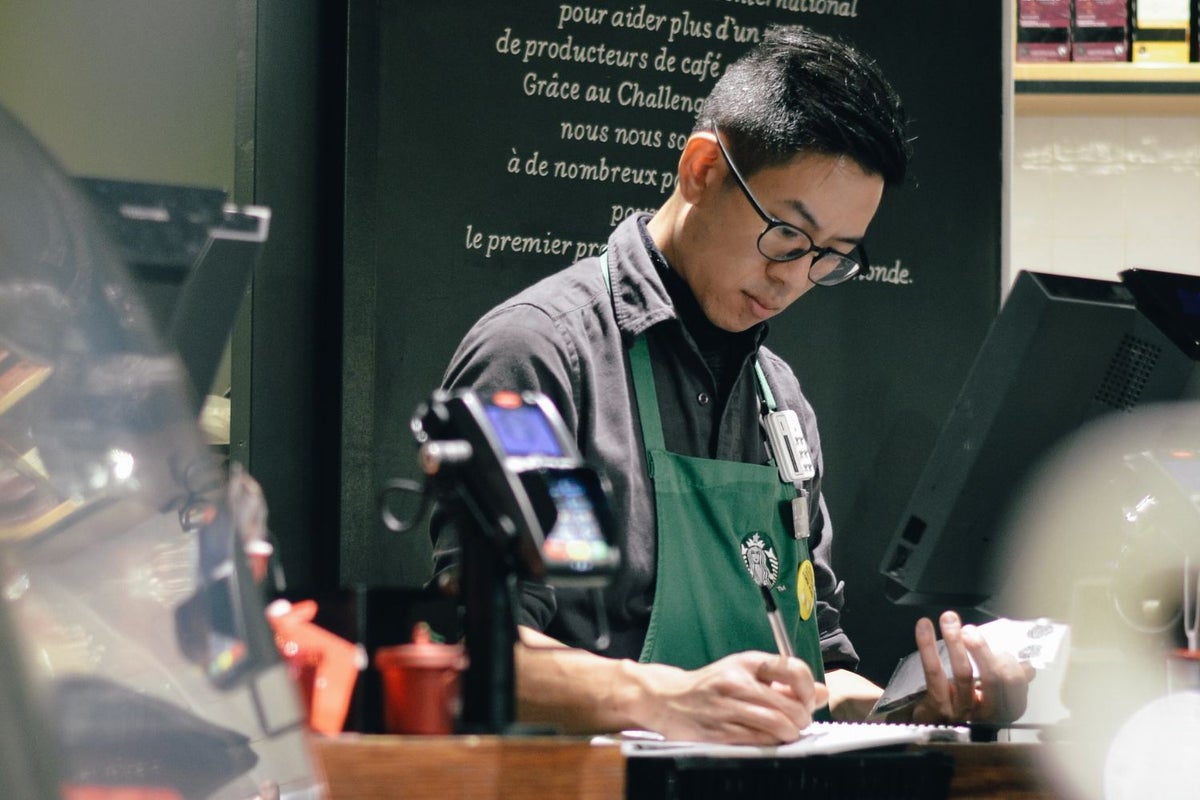[ad_1]
Starbucks Corporation SBUX surprised everyone this week by naming Reckitt Benckiser Group plc RBGLY CEO Laxman Narasimhan as Howard Schultz’s successor.
India-born Narasimhan would assume the reins at the coffee retailer at a time when the company is going through a transformation. Founder Schultz, who returned to the CEO role on an interim basis in March this year, announced a “Reinvention” plan shortly after he took over. The plan was aimed at tackling some of the fundamental issues the company was facing.
Starbucks Grows Cold: The COVID-19 pandemic that struck in 2020 constrained businesses across the board, given the lockdown restrictions in place. The repercussions were all the more serious for restaurant chains such as Starbucks.
Even ahead of the pandemic, the company’s focus on the concept of a “third place” began to wane, Fastcompany said in a report. Third place is a sociological concept referring to places where people spend time between home – the first place – and work, often referred to as the second place. Take-away orders at the retail chain reportedly accounted for about 80% of the transactions in 2019 and the sales of the more portable cold beverages outstripped that of their hot counterparts.
COVID, therefore, could not have come at a worse time, forcing the closure of a majority of the company’s outlets for a protracted period.
At Odds With Baristas: Starbucks’ relationship with its employees also began to sour, as baristas took cudgels against the company for poor wages and benefits. For them, the recourse was to organize as unions, which would vest them with bargaining power.
The drive progressed, with the baristas at a Buffalo, New York location successfully organizing as a union in 2021. Last week, a Daily News report said the New York Mayor’s office was suing the coffee retailer for unlawfully firing a barista involved in unionization efforts.
As of early August, 209 Starbucks stores have voted in favor of unionizing, CNBC said, citing data from the National Labor Relations Board. In recent months, Starbucks workers held strikes in at least 17 states in opposition to the company’s anti-union stance, according to The Guardian.
The company reportedly lost $375,000 in revenue due to the strikes.
Starbucks did budge by announcing investments in partners, including the return of Coffee Master training and black aprons, increased pay for U.S. store partners, a new Starbucks partner app, and increased training time.
See also: Why This Starbucks Analyst Is Surprised By New CEO Choice — And Optimistic
Financials Underline Fundamental Woes: Starbucks’ comps declined 14% in 2020, dragged by a 22% drop in comparable transactions. This was reflected in the top line, with revenues falling 11.3%. Non-GAAP earnings per share more than halved to $1.17, as margin took a tumble. The easier comparisons helped a rebound in performance in 2021.
Citing COVID lockdowns in China, one of its key markets, the company said in May it is suspending its 2022 guidance.
Third-quarter results released in early August showed merely 9% revenue growth on the back of 3% comps growth. China comps plummeted 44% during the quarter. Non-GAAP EPS fell from $0.99 to $0.84.
What Awaits The New CEO: Although Narasimhan comes from a consumer healthcare, nutrition, and hygiene company, he has had prior experience with beverage giant PepsiCo Inc PEP. At PepsiCo, where he was employed between 2012 and 2019, he held various roles, including that of global chief commercial officer. He was responsible for long-term strategy & digital capabilities in that capacity.
Narasimhan is also credited with helping Reckitt Benckiser navigate through a major strategic transformation and return to sustainable growth.
“We expect the focus from here will be on SBUX’s Investor Day on 9/13, the next big catalyst for the stock, where SBUX will introduce its Reinvention plan and lay out new long-term targets supported by plans focused on culture, the in-store partner experience, reimage of stores (layout, equipment, channels) and customer engagement,” Credit Suisse analyst Lauren Silberman said in a note.
Narasimhan will take over in earnest only in April 2023, although he is joining Starbucks as incoming CEO on Oct. 1. Even after formally relinquishing the CEO role in April, Schultz will stay on as a board member to assist him through the early part of his tenure.
Starbucks closed Friday’s session at $82.94, down 2.88%, according to Benzinga Pro data.
[ad_2]
Image and article originally from www.benzinga.com. Read the original article here.

